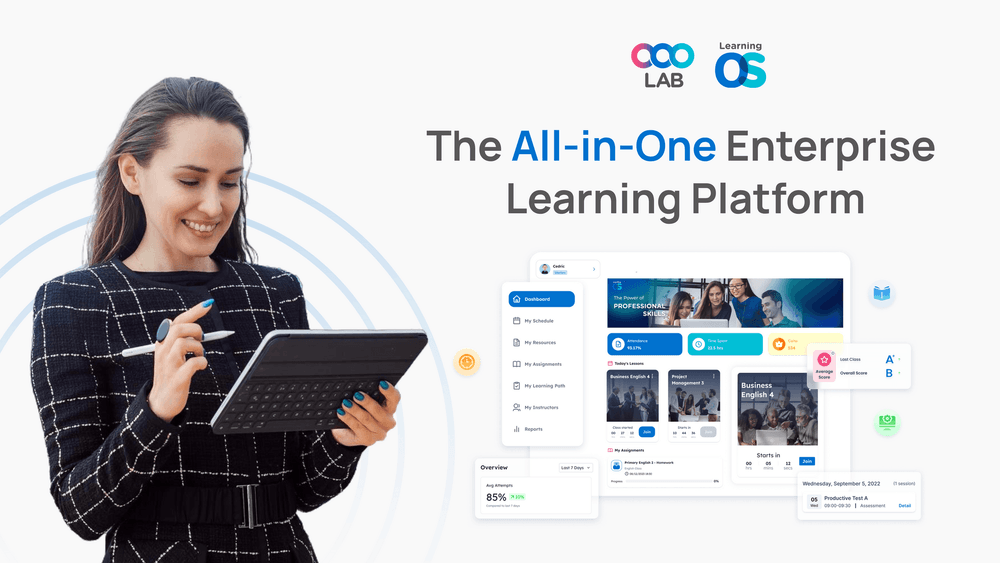The modern workforce is evolving rapidly, with hybrid work models becoming the norm across industries. Organizations must adapt to this shift by ensuring employees remain skilled, engaged, and productive, regardless of whether they work in-office, remotely, or a mix of both. An Enterprise LMS (Learning Management System) is at the forefront of this transformation, offering a scalable, flexible solution to train employees in a dynamic environment.
This blog explores how Enterprise LMS platforms empower organizations to train the hybrid workforce effectively, addressing challenges like skill development, compliance, and collaboration. From fostering continuous learning to supporting specialized training like sales training, these systems are shaping the future of workplace education. We’ll dive into the benefits, strategies, and real-world applications of Enterprise LMS platforms, backed by data and actionable insights.

I. Understanding the Hybrid Workforce and Its Training Needs
The hybrid workforce combines in-office and remote employees, creating unique challenges for training and development. According to a Gallup study, 60% of workers now operate in hybrid roles, blending physical and virtual environments. This shift demands training solutions that are accessible, engaging, and adaptable to diverse schedules and locations.
An Enterprise LMS is a centralized platform designed to deliver, manage, and track training programs at scale. Unlike traditional LMS platforms, enterprise-grade systems are built for large organizations with complex needs, offering features like AI-driven personalization, robust analytics, and seamless integration with existing HR tools. For the hybrid workforce, these systems provide:
Flexibility: Employees can access training materials anytime, anywhere, on any device.
Consistency: Standardized content ensures all workers receive the same quality of education.
Engagement: Interactive elements like gamification and microlearning keep learners motivated.
Training in a hybrid environment goes beyond compliance—it’s about building a culture of continuous learning. Whether upskilling employees or delivering targeted sales training, an Enterprise LMS ensures organizations stay competitive.
>>> Read more: What is an Enterprise LMS
>>> Read more: Customization Options for Enterprise LMS
II. Why the Hybrid Workforce Needs an Enterprise LMS
The hybrid model introduces complexities that traditional training methods struggle to address. In-person workshops are impractical for dispersed teams, while ad-hoc e-learning solutions lack the depth and scalability required for enterprise-wide programs. Here’s why an Enterprise LMS is essential for the hybrid workforce:
1. Geographic and Temporal Flexibility
Hybrid employees work across time zones and locations, making synchronous training challenging. An Enterprise LMS offers on-demand access to courses, allowing workers to learn at their own pace. For instance, a sales team in different regions can complete sales training modules tailored to local markets without needing live sessions.
2. Scalability for Growing Organizations
As companies expand, so do their training needs. A 2024 report by Deloitte found that 87% of organizations prioritize scalable learning solutions to support growth. An Enterprise LMS can onboard thousands of employees, deliver role-specific training, and track progress without overwhelming HR teams.
3. Maintaining Compliance Across Teams
Hybrid work environments complicate compliance training, especially for industries like healthcare, finance, or manufacturing. An Enterprise LMS automates compliance tracking, ensuring employees complete mandatory courses like data privacy or workplace safety. Automated reminders and certification management reduce administrative burdens.
4. Bridging Skill Gaps in Real Time
The World Economic Forum predicts that 50% of employees will need reskilling by 2025 due to technological advancements. An Enterprise LMS uses analytics to identify skill gaps and recommend targeted courses, ensuring employees stay relevant in their roles.
5. Fostering Collaboration and Culture
Hybrid teams risk feeling disconnected. An Enterprise LMS can include social learning features like discussion forums or peer-to-peer challenges, fostering collaboration. For example, sales training programs can incorporate role-playing scenarios to build team cohesion.
>>> Read more: Common challenges when implementing an Enterprise LMS
>>> Read more: Steps to implement an Enterprise LMS
>>> Read more: Enterprise LMS - revolutionizing corporate training and development
Book Free Demo with us. Bring your Training and Learning to a new height with LearningOS.

III. Key Benefits of Enterprise LMS for Hybrid Workforce Training
An Enterprise LMS isn’t just a tool—it’s a strategic asset for training the hybrid workforce. Below are the core benefits, each designed to address the unique demands of today’s work environment.
1. Seamless Accessibility and Mobile Learning
Hybrid workers rely on flexibility, and an Enterprise LMS delivers. Cloud-based platforms allow employees to access training from laptops, tablets, or smartphones, whether they’re in the office or working from home.
For example, sales training modules can be broken into bite-sized lessons, enabling sales reps to learn on the go. Features like offline access further enhance usability for employees with limited connectivity.
2. Personalized Learning Paths
No two employees have identical training needs. An Enterprise LMS leverages AI to create personalized learning paths based on role, experience, and performance. A customer service rep might focus on conflict resolution, while a manager hones leadership skills. Personalization increases engagement by 48%, according to McKinsey, as learners receive relevant content that aligns with their goals.
In sales training, personalization ensures reps learn techniques suited to their industry or client base, improving outcomes. Adaptive learning algorithms also adjust content in real time, keeping training dynamic and effective.
3. Advanced Analytics for Data-Driven Decisions
Tracking training effectiveness is critical in a hybrid environment. An Enterprise LMS provides real-time analytics on metrics like course completion, quiz scores, and skill acquisition. Administrators can identify trends, such as which teams excel in sales training or where compliance gaps exist.
These insights enable HR teams to refine programs and allocate resources efficiently. For instance, if analytics show low engagement in a module, trainers can revise content or add interactive elements like videos or quizzes.
4. Enhanced Engagement Through Gamification
Keeping hybrid workers engaged is a challenge, especially for remote employees. An Enterprise LMS incorporates gamification—leaderboards, badges, and rewards—to make learning fun. Sales teams, for example, can compete in sales training simulations, earning points for closing virtual deals.
Gamification also fosters a sense of achievement, motivating employees to complete courses and pursue continuous learning.
5. Cost Efficiency and ROI
Training a hybrid workforce manually is expensive and time-consuming. An Enterprise LMS reduces costs by automating content delivery, tracking, and reporting. Organizations save on travel, venue rentals, and printed materials. A scalable LMS also minimizes the need for additional staff to manage training, offering long-term savings.
IV. Conclusion
The hybrid workforce is here to stay, and organizations must embrace innovative training solutions to thrive. An Enterprise LMS is more than a platform—it’s a catalyst for building a skilled, adaptable, and engaged workforce. By offering flexibility, personalization, and data-driven insights, these systems address the unique challenges of hybrid work while preparing employees for the future.
Whether delivering compliance training, upskilling teams, or enhancing sales training, an Enterprise LMS empowers organizations to stay ahead in a competitive landscape. As technology evolves, so will the capabilities of LMS platforms, making them indispensable for training the workforce of tomorrow.
About us
At OOOLAB (pronounced 'uːlæb'), our mission is to make complex learning operations simple. We aim to positively impact the lives of over 1,000,000 learners and educators by the end of 2026.
OOOLAB's LearningOS provides educational institutions and corporate enterprises with an all-in-one solution to create and deliver engaging learning experiences.
We meet organizations' needs or support your growth. We provide undivided attention. We provide:
1. Dedicated success manager: We offer direct communication with a real human who'll discuss your enterprises unique learning operations and goals.
2. Personalized setup: Our team will help you transition to LearningOS on your schedule, one step at a time.
3. Around the clock support: Get help from us any time, and in any time zone.
We have recently launched a new AI training tool, Skill Quotient OS, designed to elevate hybrid training to new heights. It offers role-play exercises with scenarios and assessments.This tool can apply in sales training, corporate development and customer support training in any industry.
Reach out to us at: LinkedIn, Facebook, Instagram, Tiktok, X
FAQ
1. What are the main benefits of LearningOS
Our platform is easy to use and automates all aspects of your learning operations. It efficiently manages complex tasks, allowing you to concentrate on delivering exceptional learning experiences.
2. What main features does LearningOS offer?
Our all-in-one software solution combines a Content Management System, a Learning Management System, content authoring tools, and a mobile friendly Learner Portal.
3. Can your platform be used for corporate enterprises?
Absolutely! LearningOS is an Enterprise LMS is a great fit for corporate learning. In fact, we have clients with up to 700,000 employees using LearningOS! Upskill your workforce by creating and assigning interactive eLearning content while effortlessly tracking employee progress.
4. Who currently uses your platform?
Our platform is currently used by over 120,000+ learners, parents, and employees across 21 countries worldwide!
5. What types of content options are available on your platform?
We offer ready-to-go curriculums for various educational purposes or our expert design team can build a custom course for you. We can also upload your existing learning materials and enhance them digitally.
6. What is unique about LearningOS?
Our platform, designed by educators for educators, provides you with all the tools you need to scale. Build and promote your own hybrid and blended learning courses and save money on licensing fees by owning your own proprietary content.
7. How can I get started?
Schedule a meeting with our experts and we’ll talk about how our platform can address your unique challenges and help to grow your business.